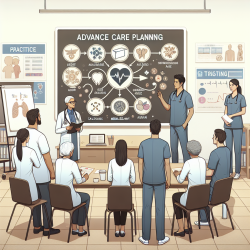Introduction
Advanced Care Planning (ACP) is a critical component of palliative care that ensures patients' wishes are respected at the end of life. Despite its importance, ACP implementation remains suboptimal globally, with significant barriers identified among healthcare providers, particularly nurses. A recent study titled "The exploration of the knowledge, attitudes and practice behaviors of advanced care planning and its related predictors among Taiwanese nurses" provides valuable insights into these barriers and suggests strategies for improvement.
Key Findings
The study, conducted in a teaching hospital in southern Taiwan, surveyed 218 nurses to assess their knowledge, attitudes, and actions regarding ACP. The findings revealed that while nurses generally held positive attitudes towards ACP, their knowledge and execution of ACP practices were lacking. Only 16.1% of physicians actively initiated ACP discussions, highlighting a gap in proactive communication.
Predictors of ACP Knowledge, Attitudes, and Actions
The study identified several predictors influencing nurses' ACP knowledge, attitudes, and actions:
- Knowledge: Position title and educational hours significantly impacted knowledge levels. Head nurses demonstrated higher knowledge, likely due to their experience and administrative roles.
- Attitudes: Nurses with higher ACP knowledge exhibited more positive attitudes. However, concerns about family acceptance negatively impacted attitudes.
- Actions: Positive attitudes towards ACP, especially belief in its importance, correlated with proactive ACP actions. Assistant head nurses were more likely to engage in ACP discussions than their counterparts.
Recommendations for Improvement
To enhance ACP implementation, the study recommends targeted educational programs that address identified predictors. Continuous professional development focusing on ACP knowledge and communication skills is essential. Simulation-based training and role-playing can effectively boost nurses' confidence and competence in ACP discussions.
Furthermore, aligning nursing practices with national policies, such as Taiwan's Patient Autonomy Act, can empower nurses to take a more active role in ACP promotion. This alignment not only improves patient outcomes but also reinforces the critical role of nurses in end-of-life care planning.
Conclusion
The study underscores the need for a systematic approach to enhance ACP knowledge and practices among nurses. By addressing the barriers and leveraging the predictors identified, healthcare institutions can foster a more proactive ACP culture. This shift will ultimately lead to better patient-centered care and improved quality of life for patients at the end of life.
To read the original research paper, please follow this link: The exploration of the knowledge, attitudes and practice behaviors of advanced care planning and its related predictors among Taiwanese nurses.










